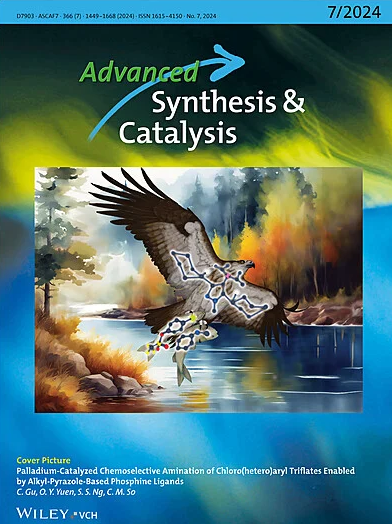Cleaner Production of Acetals/Ketals Using a Phosphorus‐Doped Biomass‐Based Carbon Catalyst via Acetalization Reaction
IF 4
2区 化学
Q2 CHEMISTRY, APPLIED
引用次数: 0
Abstract
The transformation of aldehydes and ketones into acetals and ketals has garnered significant attention due to their wide applications as fragrances, bio‐oil additives, and organic synthetic intermediates. Conventional acetalization methods, however, often rely on corrosive acids or stoichiometric additives, necessitating harsh conditions and increasing production costs. Here, the development of a phosphorus‐doped carbon catalyst is presented, that enables the acetalization of aldehydes and ketones into acetals and ketals under mild conditions (e.g., 60 °C, atmospheric pressure). This catalyst achieves a high yield of 2‐phenyl‐1,3‐dioxolane (87.1%) from benzaldehyde and exhibits exceptional stability, operating continuously for 120 h in a continuous fixed‐bed reactor. In the continuous reaction, the yield of 2‐phenyl‐1,3‐dioxolane remains over 96% in the first 18 h and slightly decreases to 86% after 120 h of continuous operation. Comprehensive physicochemical characterizations reveal that phosphorus acts as a Lewis acid sites and plays a critical role in modulating the Lewis acid sites of the PC catalysts. This work highlights the significance of optimizing acid properties for the efficient acetalization reaction, offering a promising approach to sustainable chemical synthesis.利用掺磷生物质基碳催化剂通过缩醛反应清洁生产缩醛/酮
醛类和酮类转化为缩醛和酮类,由于其在香料、生物油添加剂和有机合成中间体中的广泛应用,引起了人们的广泛关注。然而,传统的缩醛化方法通常依赖于腐蚀性酸或化学计量添加剂,需要苛刻的条件并增加生产成本。本文介绍了一种磷掺杂碳催化剂的开发,该催化剂可以在温和的条件下(例如60°C,大气压)将醛和酮缩化成缩醛和酮。该催化剂从苯甲醛中获得了2 -苯基- 1,3 -二恶烷(87.1%)的高产率,并表现出优异的稳定性,在连续固定床反应器中连续运行120小时。在连续反应中,2 -苯基- 1,3 -二氧代烷的产率在前18 h保持在96%以上,在连续反应120 h后略有下降至86%。综合理化性质表征表明,磷作为Lewis酸位点,在调节PC催化剂的Lewis酸位点中起关键作用。这项工作强调了优化酸性质对高效缩醛反应的重要性,为可持续化学合成提供了一条有前途的途径。
本文章由计算机程序翻译,如有差异,请以英文原文为准。
求助全文
约1分钟内获得全文
求助全文
来源期刊

Advanced Synthesis & Catalysis
化学-应用化学
CiteScore
9.40
自引率
7.40%
发文量
447
审稿时长
1.8 months
期刊介绍:
Advanced Synthesis & Catalysis (ASC) is the leading primary journal in organic, organometallic, and applied chemistry.
The high impact of ASC can be attributed to the unique focus of the journal, which publishes exciting new results from academic and industrial labs on efficient, practical, and environmentally friendly organic synthesis. While homogeneous, heterogeneous, organic, and enzyme catalysis are key technologies to achieve green synthesis, significant contributions to the same goal by synthesis design, reaction techniques, flow chemistry, and continuous processing, multiphase catalysis, green solvents, catalyst immobilization, and recycling, separation science, and process development are also featured in ASC. The Aims and Scope can be found in the Notice to Authors or on the first page of the table of contents in every issue.
 求助内容:
求助内容: 应助结果提醒方式:
应助结果提醒方式:


